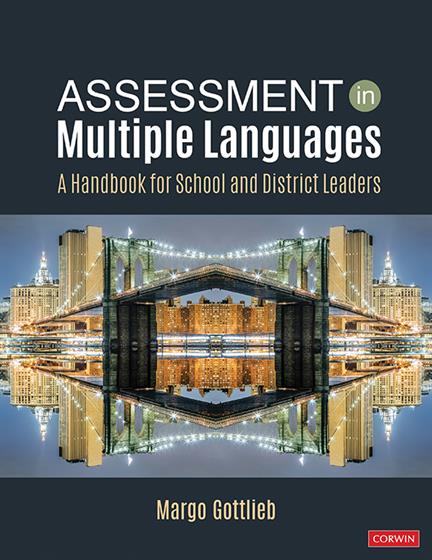Foreword
Preface
Acknowledgments
About the Author
Chapter 1: Looking at Assessment Through the Lens of Multilingual Learners
The Dilemma: But English learners isn’t an appropriate term (or label), and initial screening only in English isn’t an accurate depiction of who our multilingual learners are and what they can do!
Federal Influence on Terminology and Assessment
The Resurgence of Bilingual and Dual Language Education
Competing Theories and Views of Assessment
Creating Language and Assessment Policies
Multilingual Learners and Social-Emotional Learning
Tips for Assessment in Multiple Languages
Facing the Issue: Rethink Terminology and Language Education Models
Resolving the Dilemma: Accentuate Equitable Assessment Practices for Multilingual Learners!
Resources for School and District Leaders
Chapter 2: Getting Started With Assessment in Multiple Languages
The Dilemma: But I only speak English! How can I be expected to communicate in other languages?
How Language Policy Informs Assessment in Multiple Languages
Effective Leadership in Programs Cultivating Multiple Languages
Supporting Multilingual Learners During Difficult Times
The Assessment Cycle in Multiple Languages
Purposes for Assessment Involving Multilingual Learners
Data Associated With Assessment as, for, and of Learning
Understanding the Basics of Assessment of Learning
Evoking Systemic Change Through Social Justice
Facing the Issue: Advocate on Behalf of Your Multilingual Learners and Their Families
Resolving the Dilemma: Enlist Families and the Community in the Assessment Process!
Resources for School and District Leaders
Chapter 3: Planning Curriculum and Assessment in Multiple Languages
The Dilemma: The students are returning to school speaking a mix of languages!
Stimulating Assessment in Multiple Languages Through Distributive Leadership
Assessment as an Expression of Curriculum Design
Resources for Curriculum and Assessment in Multiple Languages
A Multilingual Curriculum Framework With Embedded Assessment
Common Assessment for Schools and Districts
Student Assessment Portfolios in Multiple Languages
Facing the Issue: Utilize Multilingual Learners’ Resources to Maximize Their Language Learning
Resolving the Dilemma: Put Trust in Your Multilingual Learners’ Language Use!
Resources for School and District Leaders
Chapter 4: Collecting and Organizing Assessment Information in Multiple Languages
The Dilemma: Discrimination abounds against multilingualism and multiculturalism . . . What can we do?
The Role of Leadership in Collecting Data in Multiple Languages
Advice for Collecting Data in a Post-Pandemic World
Improving Accessibility in Data Collection
Revisiting Resources for Assessment in Multiple Languages
Co-planning Data Collection in Multiple Languages
Collecting and Organizing Common Assessment in Multiple Languages
Organizing and Assembling Assessment Portfolios in Multiple Languages
Facing the Issue: Collect Data in Multiple Languages Using Multiple Resources to Form a Convincing Body of Evidence
Resolving the Dilemma: Take Responsibility for Diminishing Discrimination for Multilingual Learners and Their Families!
Resources for School and District Leaders
Chapter 5: Interpreting Information and Providing Feedback in Multiple Languages
The Dilemma: There simply aren’t enough qualified language teachers, so let’s place multilingual learners in “special education” classes for support.
Examining Data in Multiple Languages
Common Assessment in Multiple Languages
Collaboration in Providing Consistent Feedback
Interim/Annual Assessment in Multiple Languages
Standardized Testing: Reassessing Validity Claims
Interpreting Data in Multiple Languages for Local Accountability
Facing the Issue: Never Consider Special Education as an Option for Multilingual Learners (Unless Duly Warranted)
Resolving the Dilemma: Use Multiple Data Approaches, Sources, and Languages When Assessing Multilingual Learners!
Resources for School and District Leaders
Chapter 6: Evaluating and Reporting Assessment Information
The Dilemma: But how can we evaluate the effectiveness of instruction or programs for multilingual learners in multiple languages if we only depend on results from assessment in one language?
An Equity Framework for Assessing Multilingual Learners
Another Single Story, A Different Scenario: State Reclassification Criteria
Creating Assessment-Capable Students and Schools
Evaluating Linguistically and Culturally Responsive Assessment Practices
The Role of Rubrics in Evaluating and Reporting Assessment Results
Reporting Assessment Results
Reconsidering Grading Practices
Multilingual Learners’ Role in Evaluation and Reporting
Facing the Issue: Consider the Many Stories of Multilingual Learners and Their Families
Resolving the Dilemma: Never Evaluate Evidence or Programs for Multilingual Learners Based on a Single Story!
Resources for School and District Leaders
Chapter 7: Taking Action Based on Assessment Results
The Dilemma: The “‘COVID slide’ may be especially troublesome for English-language learners, the 5 million students still learning English in the nation’s K–12 schools” (Mitchell, 2020). How will schools and districts measure multilingual learners’ “COVID
Action 1: Engage in Reflective Practice and Inquiry
Action 2: Determine Priorities in Assessing in Multiple Languages
Action 3: Challenge the Status Quo in Assessment: Take the Multilingual Turn
Action 4: Assess Multilingual Learners From a Strengths-Based Lens
Action 5: Enact Effective Assessment Practices in Multiple Languages
Action 6: Use Assessment Data in Multiple Languages to Leverage Systemic Change
Taking Action: Lessons Learned From Crises
Facing the Issue: Consider Crises as Eye-Opening Opportunities for Multilingual Learners
Resolving the Dilemma: Provide Equitable Educational Opportunities to All Minoritized Students, Including Assessment in Multiple Languages for Multilingual Learners!
Resources for School and District Leaders
Glossary
References


